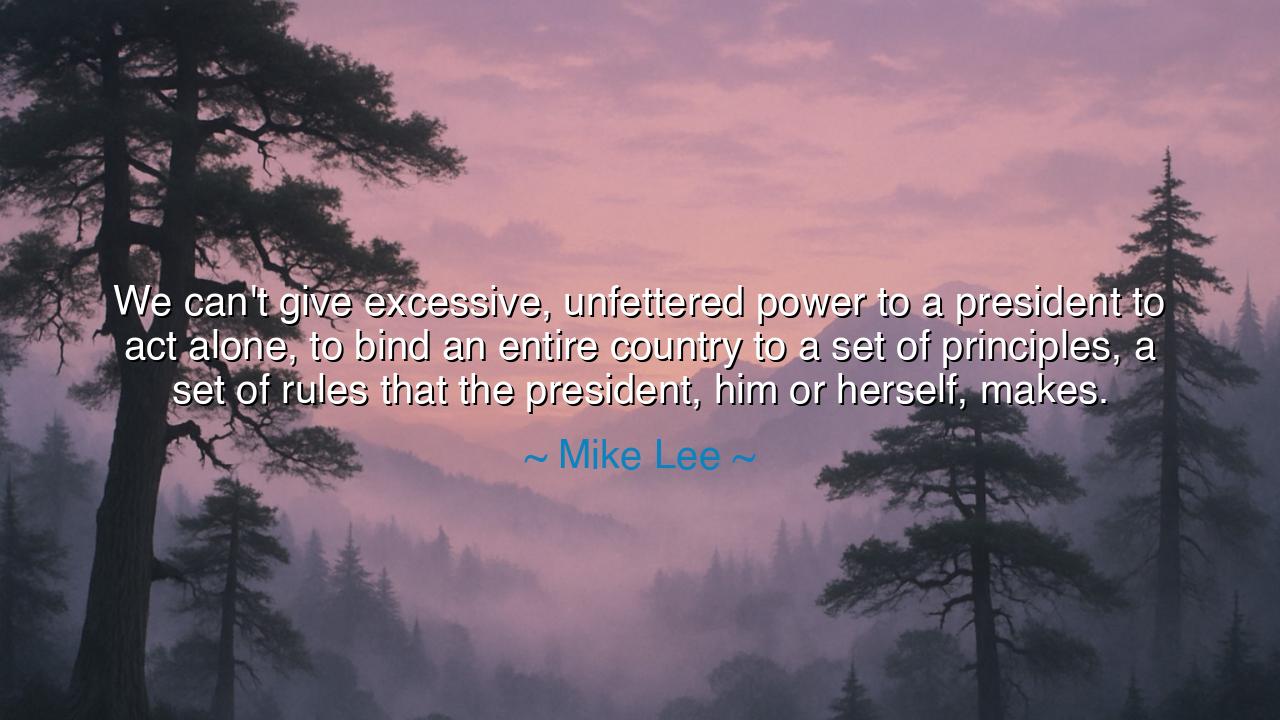
We can't give excessive, unfettered power to a president to act
We can't give excessive, unfettered power to a president to act alone, to bind an entire country to a set of principles, a set of rules that the president, him or herself, makes.






In the solemn and measured words of Mike Lee, guardian of the American Constitution and student of liberty’s law, we find a warning that echoes through the corridors of history: “We can’t give excessive, unfettered power to a president to act alone, to bind an entire country to a set of principles, a set of rules that the president, him or herself, makes.” This is no idle political remark—it is a cry for balance, a defense of the ancient principle that freedom dies where power goes unchecked. Like the prophets and philosophers of old, Lee speaks of a truth known since the birth of nations: that no single man or woman, however wise or noble, can safely wield the will of an entire people.
Mike Lee, a United States senator and constitutional scholar, voiced these words in defense of the Republic’s oldest covenant—the separation of powers. His message arose from the ongoing struggle to preserve the spirit of self-government, where rulers serve, not command. In an age when leaders are often worshipped as saviors or scorned as tyrants, Lee calls us back to humility: that power must always be tethered by law, and that even the highest office must bow before the Constitution. His warning is not born of mistrust alone, but of reverence—for the wisdom of those who, centuries ago, built a government not upon faith in a ruler, but upon faith in the people and in the restraint of power.
When he cautions against giving “excessive, unfettered power” to a president, Lee invokes a truth written in the blood of empires. History is the graveyard of nations that entrusted too much to one hand. Rome, once a republic of laws, fell into decay when Caesar seized the powers of the Senate and the people. The transition was not born in battle alone—it began with small concessions, justified by crisis, cloaked in necessity. The people, weary of disorder, yielded their liberty for the promise of security. But when the dust settled, they found themselves subjects, not citizens. Lee’s warning is, therefore, a remembrance: that tyranny often comes not as a conqueror, but as a guardian, claiming to act for the good of all.
America’s Founding Fathers understood this peril well. They had fled kings and despots, and they knew the seduction of power. That is why they forged a Constitution built upon balance and accountability—a system where ambition checks ambition, and no branch reigns above the others. The president was never meant to rule, but to serve as one steward among many. When Mike Lee speaks of restraint, he is echoing the wisdom of James Madison, who wrote, “If men were angels, no government would be necessary.” But men are not angels, and power, unbound, corrupts even the best of them. To guard liberty, the people must bind power with law, and law with conscience.
The truth of Lee’s words is visible in every age. Recall the rise of Napoleon Bonaparte, who, like many before and after him, began as a defender of liberty but crowned himself emperor in the name of efficiency. France, weary of chaos, gave him its trust—and with it, its chains. He became both master and prisoner of his own authority, and Europe burned beneath the weight of his ambition. What began as order became oppression. What began as leadership became domination. Such is the eternal lesson: unchecked power is not leadership—it is bondage, both for the ruler and the ruled.
Yet Lee’s warning is not despairing; it is hopeful, for it calls each citizen to remembrance of their sacred role. The defense of liberty does not rest in laws alone—it rests in the hearts of the people. The Constitution is but parchment if the people do not cherish its meaning. Each generation must be vigilant against the creeping comfort of authority—the temptation to say, “Let one decide for us, for we are tired of deciding.” But the cost of that comfort is the death of the Republic. A nation’s strength is not in the power of its leaders, but in the virtue of its citizens, who stand as sentinels over their own freedom.
The lesson, then, is both civic and moral: power, to remain pure, must be shared; and freedom, to remain alive, must be guarded. No office, however exalted, must ever rise above the law, and no citizen must ever surrender the duty of vigilance. To question authority is not rebellion—it is responsibility. To restrain power is not weakness—it is wisdom. Every person, from the humblest laborer to the highest senator, is part of the living body of the Republic, and if one part sleeps, the whole may fall.
So remember this, O heirs of liberty: the cry of Mike Lee is not for politics, but for principle. A free people must never look to one ruler to define them, but to the law that binds them all in equality. When power grows too mighty, let courage rise to meet it; when leaders forget their limits, let the people remind them. For the true strength of a nation is not found in the hand that governs, but in the hearts that refuse to be ruled by any will but their own. Thus shall freedom endure—not as the gift of kings, but as the birthright of the free.






AAdministratorAdministrator
Welcome, honored guests. Please leave a comment, we will respond soon